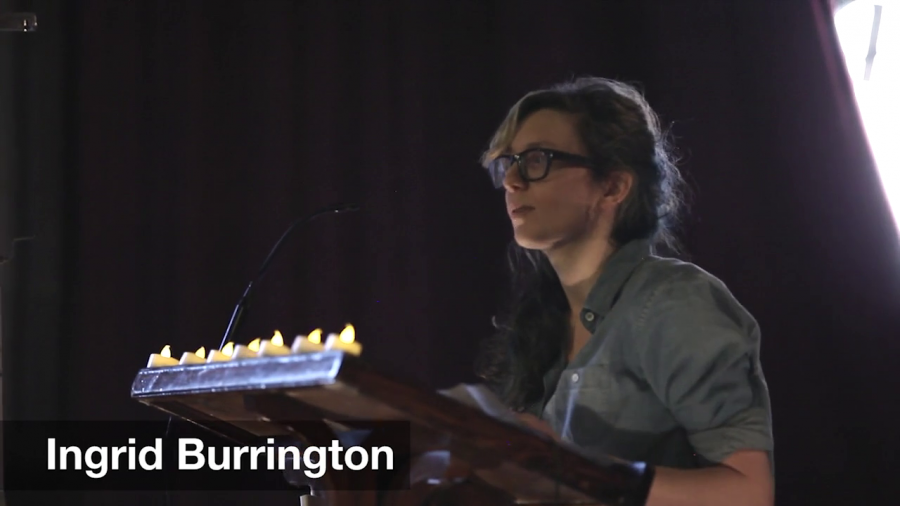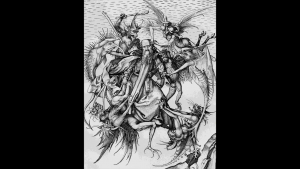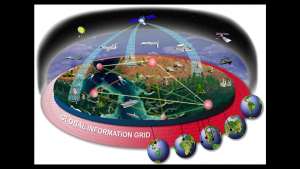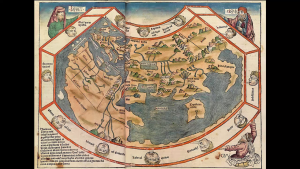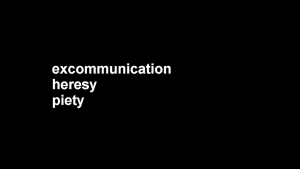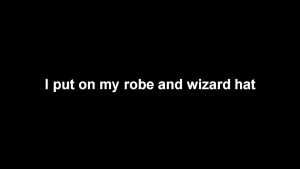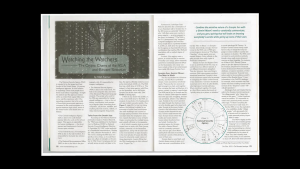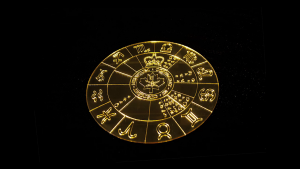
Albrecht Dürer, “The Four Horsemen Of The Apocalypse”
Albrecht Dürer is maybe one of my touchstones for ever having conversations about this. This is an image from his collection of engravings based on the Book of Revelations. They were released in 1498, and they were a body of work that brought his name to greater prominence in Western Europe.
1498 is a really canny moment to publish an edition of the Book of Revelations. Not only is the turn of any century a really great moment to start speculating about the world’s end, but it was also a period in time when there’s a lot of stuff in flux. You have a really strange geopolitical thing happening about a decade out from the Reformation. There’s a lot of known unknowns, and you have a culture and a society that is pretty keen to have something that they can believe in, and apparently quite keen to believe in the idea of the Four Horsemen being nigh. So that was 1498.

1499, interesting year, is when this guy Johannes Trithemius, the Benedictine monk sends a letter to a colleague of his, a Carmelite monk in Ghent named Bostius. And he’s talking about a text that he’s been working on, a project to interface and send secret messages across great distances through communicating with the spirit world and with angels. The monk who was supposed to receive this letter had died before the letter had arrived. It was intercepted by a different person who concluded from the letter that Trithemius was engaging with demonic spirits and involved in dark magic. His reputation was quite tarnished after that and he ended up not publishing that work until after his death; or, it wasn’t put into mass print.

The book itself was called Steganographia, and it’s a book about cryptography. It’s one of the earliest books of the Western canon of cryptography as we know it now. It’s a book about cryptography and magic. It’s a three-volume text. The third one seemingly is exclusively about astrology and cabbalistic interfacing with spirits, but if you spend enough time with it you realize is actually an enciphered text and in about 1998 somebody actually broke the code.
The ironic thing is in order to be able to justify creating a body of work like Steganographia, to do the kind of work in cryptography that Trithemius was able to do, he had to do a lot of work to justify his own practices and did a lot of work himself in demonology. He had written many texts defining different spectrums of what demons did and didn’t do, had an unfinished outline for a text that was an encyclopedia of demons. Between the 14th and 17th century you have a lot of interesting work in demon studies. The Church is always sort of besieged by these creatures, and demonology’s a way in which can kind of maintain a monopoly on miracles. They get to decide what is in fact a divine intervention and an act of God, and what is outside of the realm of a one true God and therefore an act of unspeakable evil and going to lead to eternal damnation. Institutions of power are really good at identifying and convincing themselves that they are constantly under siege from existential threats, even if that existential is merely something that they do not understand.
There’s a really interesting thing in some of Trithemius’ work where he talks about how curiosity is a form of lust for knowledge which is not necessary, which I kind of love. Monks must’ve really hated trivia night.
So I’m at a conference called FutureEverything and I’m talking to you about a 15th century monk. I’m trying to figure out how to explain why I’m doing that to you, and this is going to seem like a bit of a veer, but I think there’s something interesting about a discipline that historically is tied to political intrigue, to secrecy, being linked into this debate over what is good magic or true divine magic, and what is the work of demons. And I think there is something interesting to be said about the moment we are in right now and how states themselves kind of identify and invent existential threats to justify their own behavior. In this case I’m specifically thinking a lot about the way that states talk about terrorism, particularly online cyber-terror, and simultaneously justify their own rhetoric for a total globalized mass-surveillance network.
I really love graphics like these. I really love these weird clip art-ty diagrams that show you how the state believes that they know everything, because they really remind me of Medieval maps. They kind of betray so much of their own perspective that is obviously lacking something. But you need that. You need to have that level of conviction in your own certainty and a sense of a totalizing worldview to justify a worldview that looks like that:

As true with states we could also argue goes with stacks. This is mostly a conversation about states. But ultimately I think we’re still kind of dealing with the question of who gets to have a monopoly on miracles. Who gets to backdoor and who gets sent to prison for four years for finding the backdoor? In general the options that are presented for how to respond to this kind of state are basically you can either try and walk away, which good luck living in the world if you want to get off of the grid and how long you can do that. Let me know. Well, I guess you can’t, because you’re not online. The other option would be to resist and engage in some forms of sabotage or attack, which also: have fun in prison when you do that. Or your third option is live with it, work with it, just try and figure out how to exist within that system.
And I’m not sure I’m particularly fond of any of those options for myself. And I’m not sure that I have a good answer for how to fight, but perhaps if how to survive, this tends to be my default form of magic:
I think there is something valuable about reclaiming the language of magic. (Oh, I really hoped that you guys would appreciate that joke. I’m so sad.) I think there’s something really troubling about the way in which magic can be invoked by institutions of power to obfuscate or deny responsibility for their own actions. But I would not say that that means we should abandon it entirely. In fact I think all the more reason to reclaim it. Frankly, I don’t really want to build a future where there’s no magic. That sounds quite boring.
I’m going to just wrap up quickly with a bit of a detour which is just an example of a joke that maybe is based on trying to show how substituting one faith for another illustrates the fallacies of them. One of the things that the Christians really really hated was when pagans would say Jesus wasn’t actually the son of God or performing divine miracles he was just doing magic, which I kind of love because it’s like, “It’s not your supernatural belief that was happening, it was our supernatural belief. Get with it.”
So about a year and a half ago I found this magazine in a book store, and I was pretty excited about it. The article…at no point does anyone say, “Why is astrology useful for trying to understand this problem?” I mean, I guess it wouldn’t, it’s an astrology magazine. They don’t really have to convince anybody. And there’s a certain kind of conviction that goes into writing a text like this. You have to decide when the NSA’s birthday is if you’re going to build an astrology chart for it. Which is debatable, right? You could say that’s when it was instituted into policy, or you could say when it’s the first moment that the United States engaged in extra-judicial surveillance. It’s questionable.
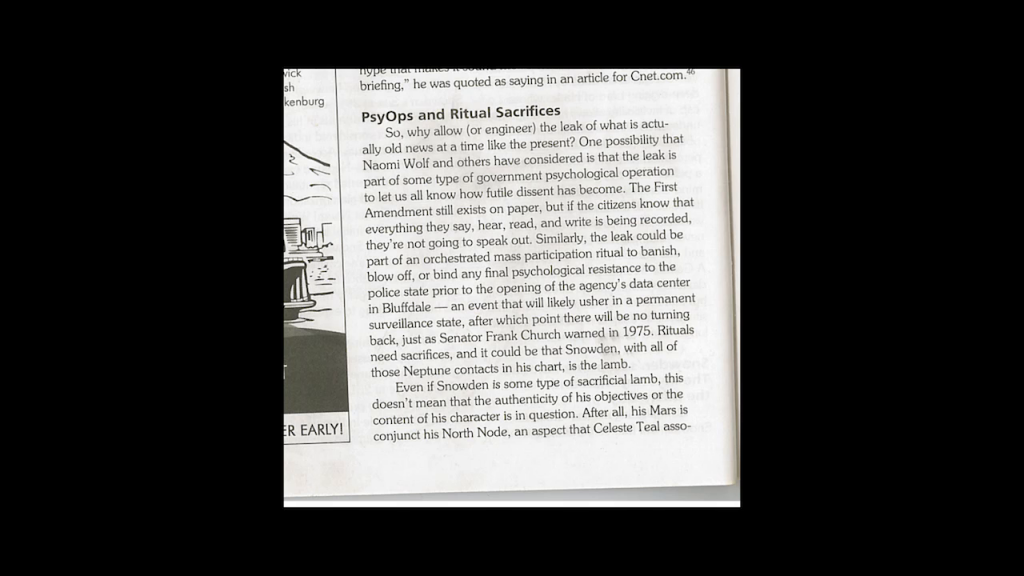
There’s a lot of moments in it that I’m not sure what kind of journalism we want to call this. But there was a part of me when reading this was like, you know, why not? Nothing that we currently have to articulate these institutions seem to to work, and none of it seems to open up the system any further, so why not look at the stars? Or why not just demonstrate the shortcomings of their own systems by trying to encapsulate them in another one?
So I made these gold seals. They’re about 10″ in diameter and they’re astrology charts for all of the Five Eyes agencies. Five was useful because then you can make a pentagram. But also it’s nice to represent each one, and they’re sort of symbols of a certain kind of information failure and of the failure of any totalizing faith. It’s kind of as ridiculous to believe that you can justify killing a person based on phone metadata as it is to believe that you could make any strong decision based on the movement of planets. They’re these captivating objects that you’re kind of drawn to and fascinated by but also can’t really tell you all that much.
They’re not even particularly great charts. I didn’t go to a professional astrologer to generate these, and if you read the automatically-generated profiles for any of these government agencies they’re kind of ridiculous and could be about possibly anything. Which is sort of how you could read a lot of what comes out of mass data collection. It kind of tends toward a sort of mediocrity that might not actually tell you anything useful.
So those were a bunch of jokes. That’s a very long joke. And I don’t really know… That is not going to stop this system. It doesn’t necessarily radically transform it. And I think that art often provides a spiritual answer to a political question, and I kind of understand where that is maybe not enough. That is what I know how to do. If I knew how to solve political problems, I wouldn’t be speaking at this conference.
And I guess I’m going to end with this image mostly because it just cheers me up quite a bit, and is maybe a different kind of weird magic and/or miracle, or about kind of learning to live with that which we do not under, which is of Saint Jerome and the lion, another Albrecht Dürer engraving.

Albrecht Dürer, “Saint Jerome in His Study”
I guess that’s all I’ve got. Thank you.
Further Reference
The Haunted Machines site, where Ingrid has a short piece “Living with Our Daemons.”
Dedicated page for Haunted Machines at the main FutureEverything site.
